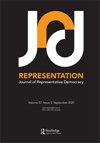公众审议还是民众投票?衡量不同类型的参与式民主的表现
Q2 Social Sciences
引用次数: 1
摘要
本文章由计算机程序翻译,如有差异,请以英文原文为准。
Public Deliberation or Popular Votes? Measuring the Performance of Different Types of Participatory Democracy
ABSTRACT There is a growing body of empirical research on democracies with strong or weak deliberative and/or direct democratic features. But how do these features affect the performance of a country? How do participatory types of democracies differ considering system performance, democratic performance, and social performance? Which type is more successful? Although these questions are most crucial and pressing in democracy research, they remain mostly unexplored. Our explorative study is a start to fill this gap. It analyzes which participatory types of democracies perform better: countries with less or more deliberation, countries with less or more direct democratic elements, countries that score high or low on both features. Based on several datasets and applying different statistical tools, we show that the associations between these types of democracy and performance are multifaceted. The most important finding, however, is clear-cut. Democracies with strong deliberative as well as strong direct democratic features perform better than other democracies. Combining deliberation with direct democracy seems to be the optimal formula to guarantee high social, system, and democratic performance. However, many questions remain open and we discuss the need for future research.
求助全文
通过发布文献求助,成功后即可免费获取论文全文。
去求助
来源期刊

Representation
Social Sciences-Sociology and Political Science
CiteScore
3.50
自引率
0.00%
发文量
31
期刊介绍:
This change in scope follows two paths. Firstly, it seeks contributors who are interested in exploring the interface between democratic practice and theory. In particular, this focus seeks contributions that apply theoretical insights to actual examples of current practice. Secondly, while not neglecting the current focus of the journal, we would like to expand its international coverage so that the journal will offer our readers insights in the state of democracy worldwide.
 求助内容:
求助内容: 应助结果提醒方式:
应助结果提醒方式:


